The Skinny Pig is a hairless guinea pig breed. They aren’t completely bald, but have a few hairs on their face, legs and feet. Interestingly, despite being hairless guinea pigs, the Skinny Pig comes in a few colors and patterns that show up in the different shades of their skin tone! They are shy, affectionate and social pets that do best in a large indoor enclosure with soft bedding. An adult Skinny Pig will be a little smaller than your standard hairy piggie, and sadly probably won’t live quite as long. Just like their hairy guinea pig friends, they need at least one other guinea pig companion. Today we’ll look at the breed traits, health and characteristics of the friendly little hairless cavy.
Contents
- What are Skinny Pigs?
- What do Skinny Pigs look like?
- Skinny Pig care, caging and bathing
- Baby Skinny Pigs
- How much do hairless guinea pigs cost?
- Are Skinny Pigs good pets?
In this article we will look at why Skinny Pigs have no hair and how this unusual gene came about. Skinny pigs need some special care, and are not suited to outdoor pet homes. We will help you to decide whether you are the right owner for a Skinny Pig, and how to take the best possible care of them.
What Is a Skinny Pig?
A Skinny Pig is a hairless guinea pig. More than that though, they’re one of the newer guinea pig breeds. These guinea pigs, contrary to their name are not completely bald. They possess a small amount of hair on their face and limbs. As a result, they’re strictly indoor pets — for warmth and protection. Besides being hairless and having a few unique challenges, Skinny Pigs are just like any other guinea pig!
Despite what you might think, skinny pig is not the name for a skinny guinea pig. A skinny pig is actually the name for a type of hairless guinea pig! They aren’t actually any skinnier, or slimmer than a regular guinea pig. But their lack of hair certainly gives that impression.
Additionally, despite what it looks like on the first glance, they aren’t technically totally hairless either. Most skinny pigs will actually have a small amount of fur on their faces, specifically their muzzle, around their nose. They will also have hairy feet and maybe some hair on their legs. They also appear to have quite saggy skin, which increases the impression of skinniness!
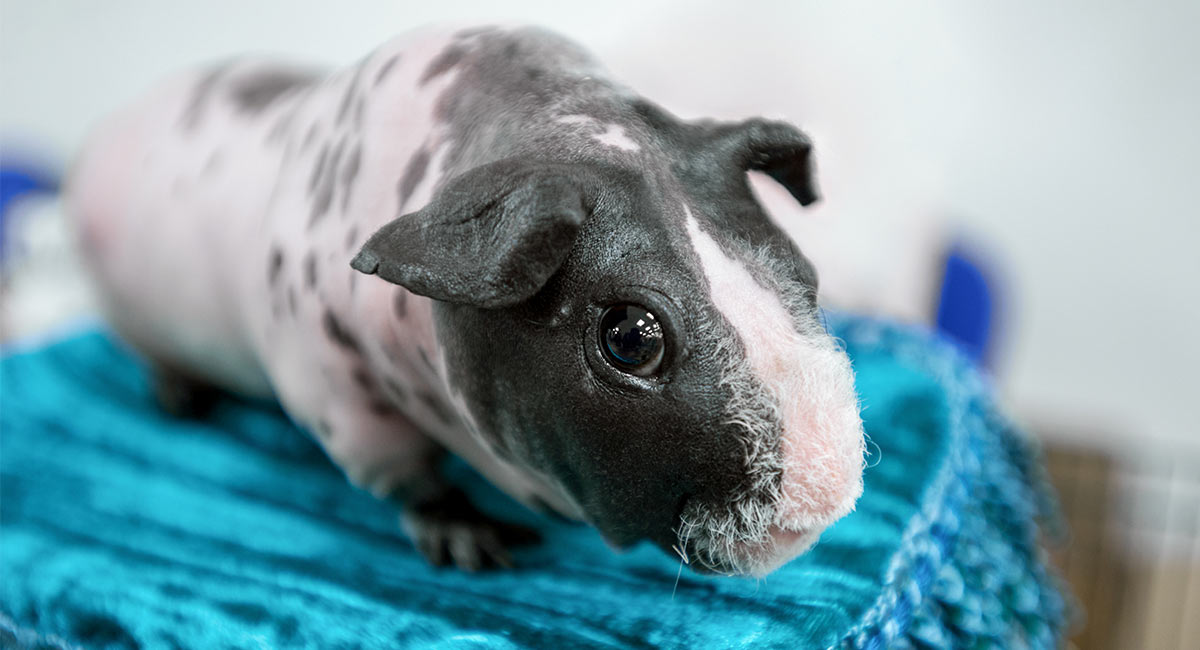
Where Does the Skinny Pig Come From?
Now that we’ve answered “what is a skinny pig?” we should know where they come from. The first skinny pigs were bred by scientists. When the mutation for hairlessness was discovered, they decided that it would be really useful to develop it.
Hairless guinea pigs could be used more conveniently for their research. They could avoid the stress of shaving and have quick access to their skin. But it wasn’t easy going. The first of this breed were not healthy. In fact, they were very ill indeed. Beyond this, they also found it hard to get females to conceive. And, they couldn’t successfully mate them to each other.
Most importantly, there were serious problems regarding their lifespan, as they were immunocompromised. Unable to fight off normal infections, they died young. And that’s if they even got past the stage of weaning. It was hard work getting these early skinny pigs to an adequate level of health. However, with careful breeding they managed however to create skinny pigs as they are known today.
Skinny Pig Appearance
Hairless skinny pig size tends to be smaller than the average guinea pig. This breed’s hairlessness isn’t linked to their sex. You are just as likely to find a male skinny pig as a female skinny pig.
How Big Are Skinny Pigs?
Skinny pigs are often close in size to the average guinea pig — if a tad smaller due to hairlessness. They should weigh between 1-2 lbs and measure between 9 and 12 inches from head to rear.
Skinny Pig Colors
Despite their lack of hair, this breed can come in a range of colors. They can also inherit colors from haired ancestors as well! As shown in one study on pigmentation, if you mate a red-haired guinea pig with a hairless albino guinea pig, their babies could include hairless, but red-skinned skinny pigs! So despite their lack of hair, they can still be a variety of colors.
Black skinny pig babies and Dalmatian skinny pig babies are particularly common examples you can find when looking for skinny pig breeders.
Skinny Pig Genetics
Breeding is one of the most fascinating things about the hairless guinea pig. Breeding these guinea pigs needs to be carried out with care. The gene for hairlessness is recessive. This means that both parents need to carry it for the babies to have it passed along.
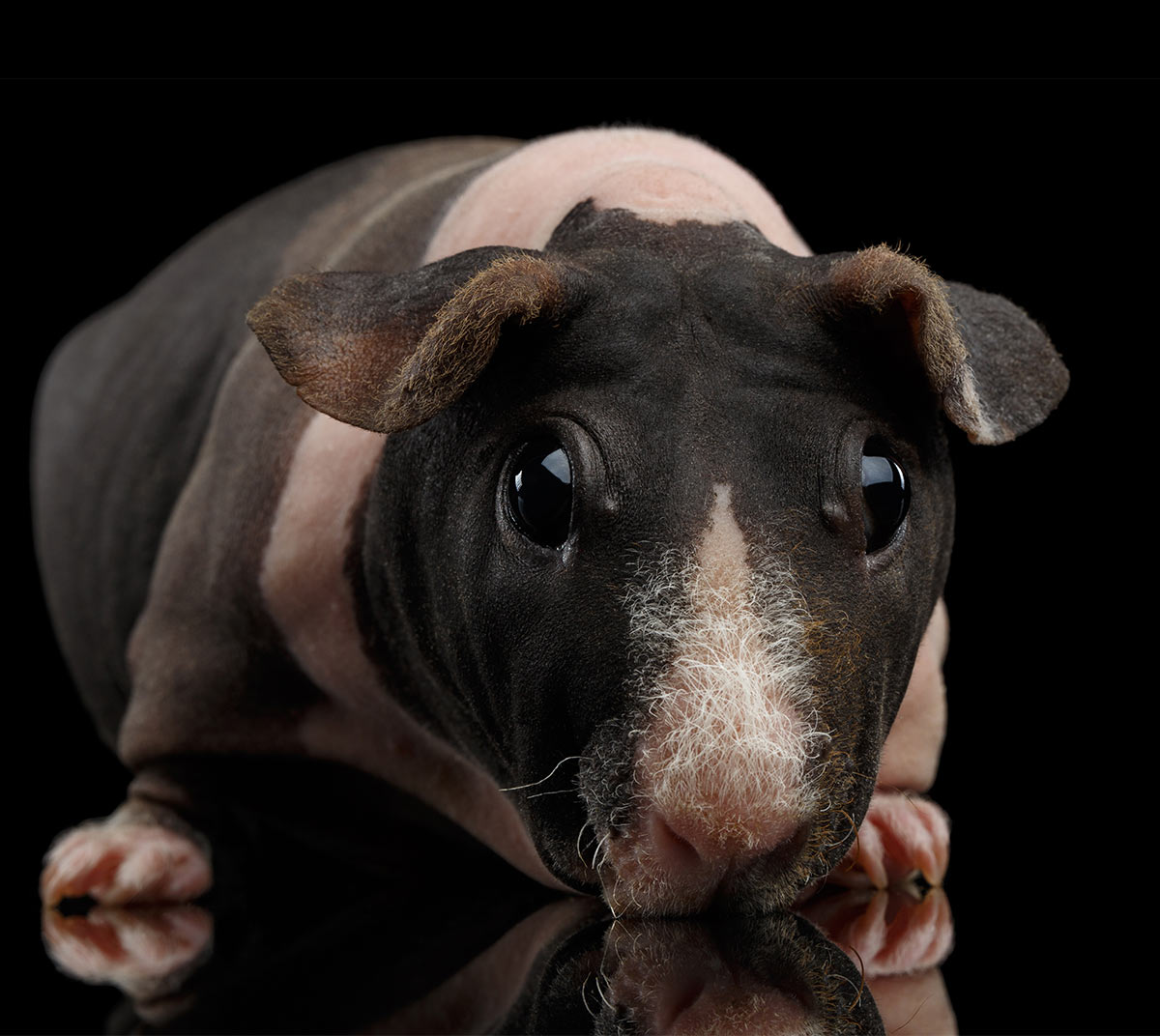
So, if you breed two skinny pigs together, then all the babies will be hairless. But if you breed a haired with a hairless guinea pig, then the babies could be haired or hairless. Then again, when you breed two haired guinea pigs together that both carry the gene, there is a chance of skinny pig babies. However, most haired guinea pigs do not carry this gene, unless they are a part of a skinny pig breeding program.
There are a few varieties of hairless guinea pigs, and not all the genes are the same. For example, one variety, the Baldwin guinea pig, which is utterly bald, has its hairlessness caused by a different gene. So a Baldwin crossed with a Skinny pig will amazingly produce haired babies!
It probably won’t come as a surprise to you to hear that guinea pigs are often used as, well, guinea pigs. They’ve been bred and treated by way of testing new medicines in scientific experimentation. And the skinny pig is no exception. In fact, in some cases it is preferred! Especially for research concerning skin conditions. They are used for testing various topical medications, as well as some rather more invasive things. And it’s not just because their skin doesn’t need shaving. They have been seen to be more sensitive when tested.
Skinny Pig Temperament
Just like any other guinea pig variety, the hairless guinea pig is highly social. They are happiest when in the company of at least one other guinea pig. These outgoing creatures will chatter away to each other, and to you.
You can keep skinny pigs with their haired friends quite happily, and it won’t affect their relationship at all. But you will need to keep them all under the same high levels of care that the hairless piggies’ require.
Do Skinny Pigs Bite?
Skinny Pigs have teeth, so of course, they bite occasionally. But they’re generally a safe pet — these pets are rarely aggressive. Sometimes, Skinny pigs will bite you when they mean to nibble on themselves. This may indicate the presence of mites or fleas. If you’re concerned about your piggie, contact your veterinarian for an exam right away.
Other times, though, if your pig is nibbling/biting while you are holding it, it may need to get down to urinate.
Taming Skinny Pigs
Skinny Pigs are pretty easy to tame. Although they may be nervous in the beginning, you shouldn’t have to stress too much about them. By being consistently gentle with them, they’ll come to trust you. Ensure that you handle them with care and supervise your kids with them. Once they feel safe, they’re quite tame and unlikely to bite or hurt anyone.
Exercising Your Hairless Guinea Pig
Like other guinea pigs, skinny pigs just need space to roam. Don’t bother buying fancy exercise equipment. Instead, stick to letting them walk around in their cages or out once in a while.
Skinny Pig Health
As we’ve seen, early hairless guinea pigs had numerous health problems. Especially regarding their immunity. However, skinny pigs today are what is known as immunocompetent. This means that they have a normal immune response to antigens. Their bodies now usually react properly to things that could make them sick. So they do not have the same immune issues their predecessors did.
But it doesn’t mean that they are entirely as healthy as a haired guinea pig. They begin life as fully functioning, running babies. Just like any other guinea pig. But they have a few specific health issues due to their hairless nature.
Health Issues
Sensitivity: They are much more sensitive to their environment, being irritated by the wood chippings for example. They are also far more sensitive to cold.
In some climates it is fine to keep guinea pigs outdoors for much of the year, but a skinny pig will suffer from the cold far more quickly.
Exposure to Harm: Hair is also a great protection from physical harm. Scrapes and scratches that would never have occurred on a haired guinea pig are commonplace on a hairless one.
Tumors: Besides these specific issues, they may also be prone to tumors that affect the typical guinea pig.
Skin Issues: Guinea pigs in general can be prone to skin issues, but especially so with hairless guinea pigs. They can suffer from ringworm, parasites, and other skin infections. It helps to keep them well-fed and avoid overcrowding.
Skinny Pig Lifespan
In the initial breeding stages, this was found to be problematic. Unfortunately, they simply did not live as long as their haired brothers and sisters.
There aren’t any studies that show the lifespan of today’s skinny pigs in a way that has been scientifically verified.
However, breeders claim that they live as long as haired guinea pigs (5-7 years on average). It seems unlikely that they would be useful to scientists to the extent that they are if their lifespans were desperately short.
Since skinny pigs have competent immune systems, we can assume that there would be no reason that they should be any less healthy. Other than the skin problems we have already looked at, at least.
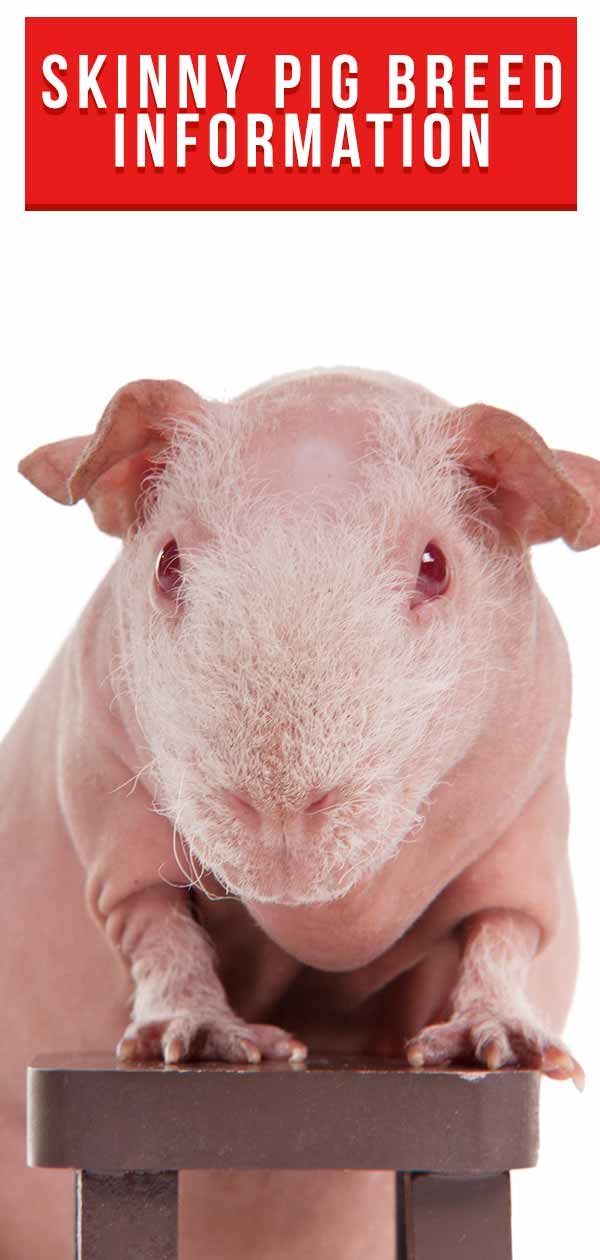
Do Skinny Pigs Smell?
No. With less hair, it’s highly unlikely that they would smell poorly.
Skinny Pig Care
If you already own a skinny pig or two, you know that they are a bit high maintenance. Skinny pig care is trickier than haired guinea pig care, but it’s not impossible or unmanageable for most people.
For one, they are social and do need to be kept in pairs, or better still small groups. They need space to move around, and a great diet.
Next, because of their sensitive skin, it’s important to use sunscreen on these hairless guinea pigs, should they venture outside. Ultimately though, you should ensure they remain indoors.
They’re also known to have a healthier appetite than their hairy contemporaries. Therefore, be prepared to feed your hairless guinea pig more than the average guinea pig.
They need all that food to keep their metabolism going and to stay warm.
Skinny Pig Cages
Your skinny pig might be more likely to get themselves scratched or scraped than a hairy pig would.
So it’s important to be really vigilant when choosing a cage. Pick one without sharp edges, and choose chew blocks and toys that will not catch on their loose skin.
It might be sensible to use a fleece bedding rather than wood chippings, to avoid potential scratches or dermatitis.
Do Skinny Pigs Need Baths?
You shouldn’t need to bathe your hairless guinea pig. Since they lack the fur that typically harbors urine and dirt on haired guinea pigs, these piggies do not need to be bathed as often. The best thing to do for yours is to keep their cage and bedding clean.
Keeping Skinny Pigs together
As mentioned, Skinny Pigs love the company of other guinea pigs — whether hairy or hairless!
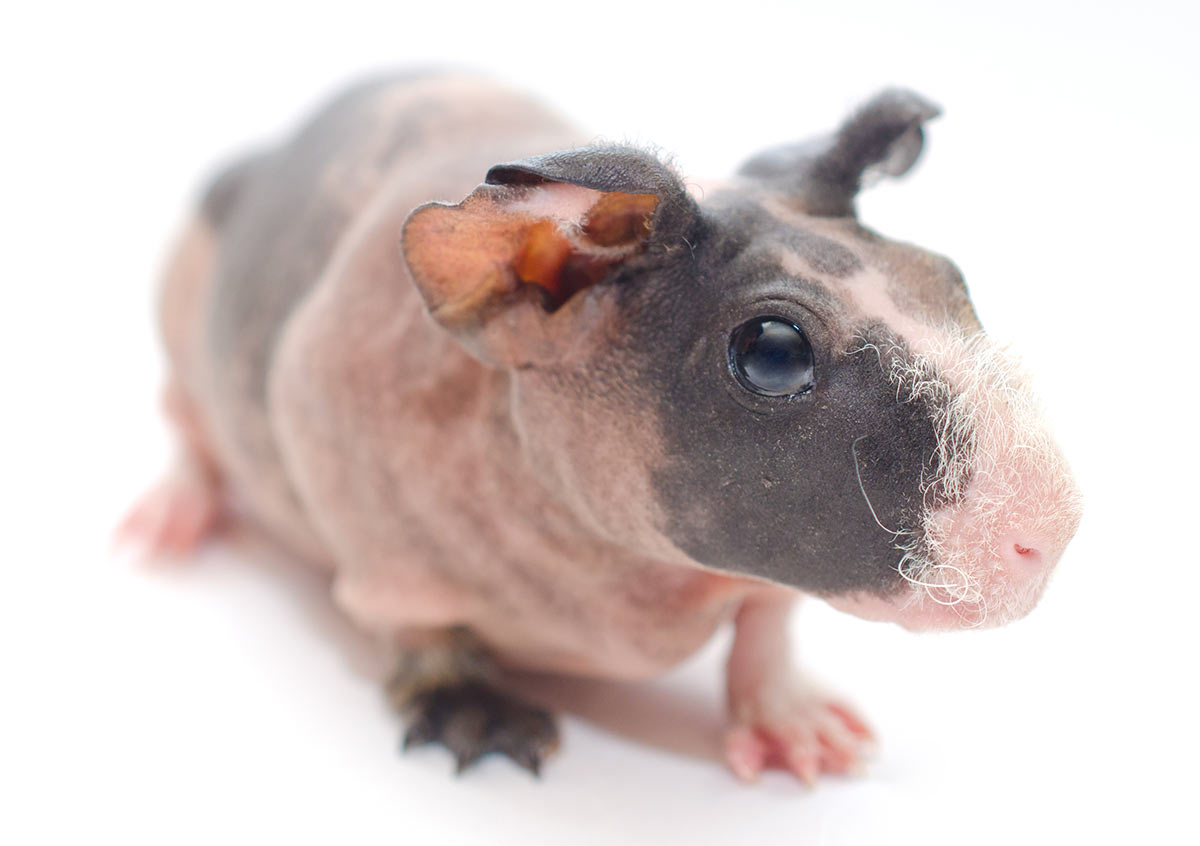
Caring for a Baby Skinny Pig
Skinny pigs are herbivores. This means that they eat plants. Like their hairy brothers, these pigs are happy just to munch on Timothy hay, and leafy greens. They also eat pellets and are cecotropes — they eat their poop.
Still, you have to feed them a daily vitamin C supplement, whether in tablet or liquid. This is because guinea pigs do not make vitamin C on their own.
For babies though, they need their mother’s milk for the first few days of their life. If your baby skinny pig was rejected by its mother, then you’ll need to hand-feed it.
Use a teaspoon rather than with a syringe because baby skinny pigs can choke this way. You can either use full-fat goat’s milk, or make a milk mixture. We recommend using half water half evaporated milk. After a few days, they can start eating like the adult skinny pigs.
Are Skinny Pigs Good Pets?
They can be lovely pets. But there are two things to consider. The first is whether you can offer them the level of care they need. Skinny pig care is a bit different.
These are indoor-only pets, with sensitive skin. They’re more likely to get scratched or experience skin problems than their furry friends.
The second, however, is an ethical question, and only you can answer that! Should we be encouraging the breeding of a potentially less healthy alternative to the usual guinea pig?
In our opinion, the best way to buy a baby guinea pig is to choose one that has been bred with health as the number one priority. The same is true for any animal, of any breed.
So, it might be best not to choose one bred simply for the color, the coat, or the lack thereof. But, instead to choose for the betterment of the breed. And of course, to provide the best quality of life for the new baby.
Healthy guinea pigs are those that are as close to their natural form as you can find. This means having the traditional guinea pig shape, with a thick coat of fur. But if your heart is set on a hairless guinea pig and you’re willing to care for it, then go ahead.
Just be sure to protect their skin and keep them warm. Overall, ensure that they’re comfortable in a natural environment.
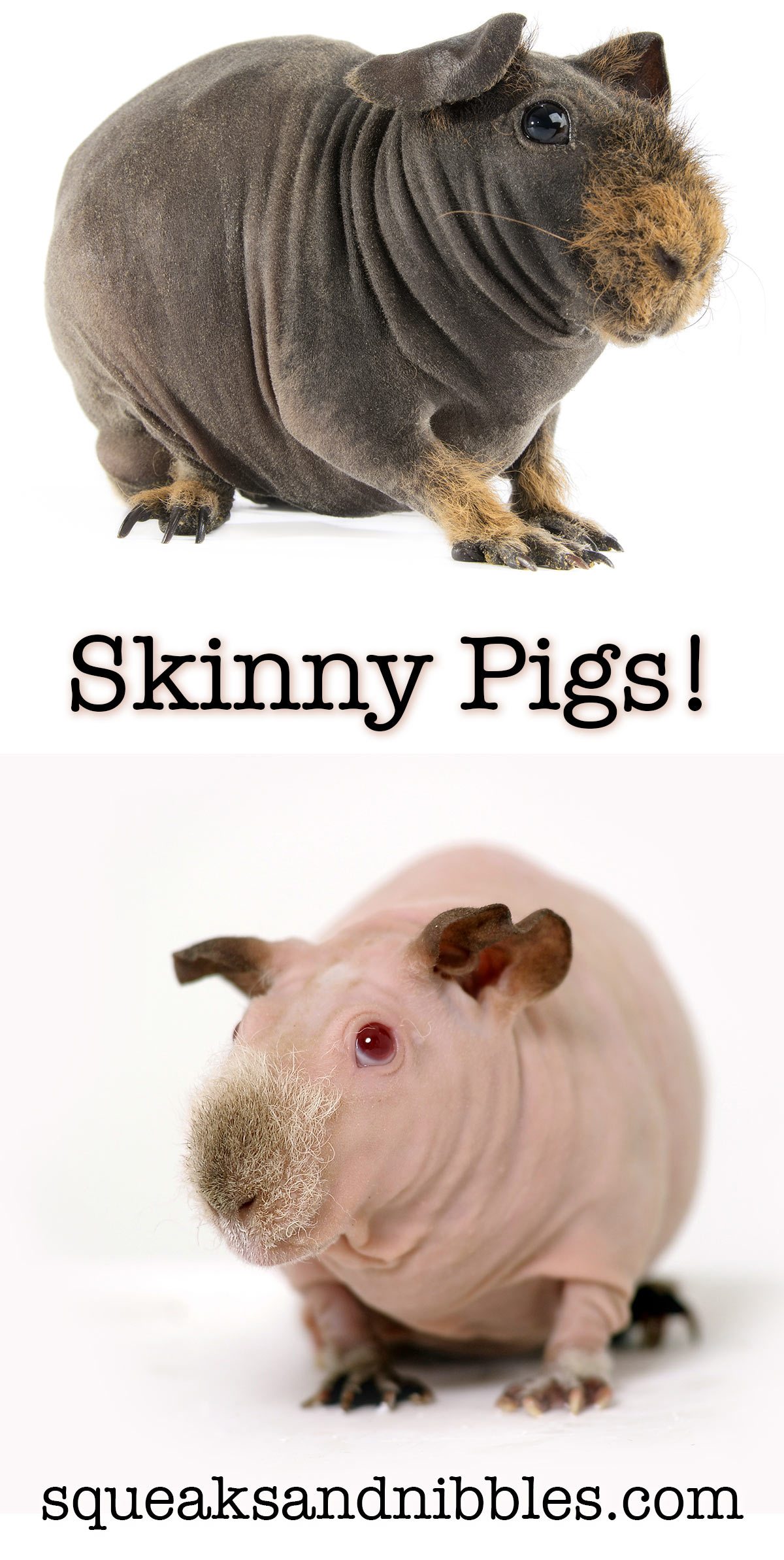
How Much Do Hairless Guinea Pigs Cost?
So, if you are thinking of buying a skinny pig you may wonder: how much are hairless guinea pigs? Well, they are a fair whack more than a regular haired guinea pig.
This isn’t just because they are rare. It’s also due to the higher level of care and attention that they require from the breeder in order to stay healthy.
So, you can expect to spend between $100 – $200 for a skinny pig baby. But remember, guinea pigs don’t like to be alone! So you will probably need to buy at least two together.
Similar Breeds
If you’re really into the hairless look, here are some other hairless breeds you may want to look into.
- Baldwin Guinea Pig
- Hairless Rat
Products and Accessories
Many guinea pig accessories also work great for skinny pigs. Just make sure they’re gentle on the skin. These are some of our favorites:
- DIY guinea pig toys
- Best guinea pig toys
- Best guinea pig chew toys
- Favorite guinea pig water bottles
- Best guinea pig carrier
- Indoor guinea pig cages we love
- Best guinea pig wooden cages
Is a Skinny Pig Right for Me?
I’ve been keeping guinea pigs for nearly forty years, and have no doubt that they are one of the very best pets out there. For most families. But the standard guinea pig has a nice coat to keep them warm and protected from life’s little bumps and scrapes. The Skinny Pig looks fascinating, but their lack of fur gives the piggie itself only an inconvenience and no benefits. So for me, they are one best avoided in your search for a pet.
Skinny pigs are a marvel of science and unique in their own right. Although hairless, these animals are social and just as loving as their hairy counterparts. However, without fur, they’re vulnerable to cold, skin issues, and injury. If you have children, or lack the space for a safe cage, these may not be your best choice.
Do You Have a Skinny Pig?
Do you have a Skinny Pig living at home with you? We’d love to hear all about them in the comments below.
References And Resources
- Myers et al. 1991. Varicella in Hairless Guinea Pigs. The Journal of Infectious Diseases.
- Miyauchi and Horio 1992 A New Animal Model for Contact Dermatitis: The Hairless Guinea Pig. The Journal of Dermatology.
- Marlow et al. 1990. Sulfur Mustard-Induced Skin Injury in Hairless Guinea Pigs. Journal of Toxicology: Cutaneous and Ocular Toxicology.
- Moon et al. 1990. Diseased Skin Models in the Hairless Guinea Pig: in vivo Percutaneous Absorption. Dermatology Clinical and Laboratory Investigation.
- Kan et al. 2003. Sulfur Mustard-Induced Apoptosis in Hairless Guinea Pig Skin. Toxicologic Pathology.
- Fullerton and Serup. 1997. Topical D-vitamins: multiparametric comparison of the irritant potential of calcipotriol, tacalcitol and calcitriol in a hairless guinea pig model. Contact Dermatitis.
- Bolognia et al. 1990. Hairlesss Pigmented Guinea Pigs: A New Model For The Study of Mammalian Pigmentation.Pigment Cell and Melonoma Research.
- Taylor et al. 1993. Relationships between Acetone, Cataracts, and Ascorbate in Hairless Guinea Pigs. Journal of Ophthalmic Research.
- Reed and O’Donoghue 1979 A new guinea pig mutant with abnormal hair production and immunodeficiency. Europe PMC Plus.
- Clemons and Seeman The Laboratory Guinea Pig: Second Edition.
- Bellinger et al. 2015. An ecologically relevant guinea pig model of fetal behavior. Behavioral Brain Research.
- RSPCA. Guinea Pigs: Good Practices for Housing and Care.
Wiki How. How to Get Your Guinea Pig to Stop Biting You. Elliot P. MRCVS
VCA Hospitals. Health Problems in Guinea Pigs. Hess, L. DVM; Axelson, R. DVM

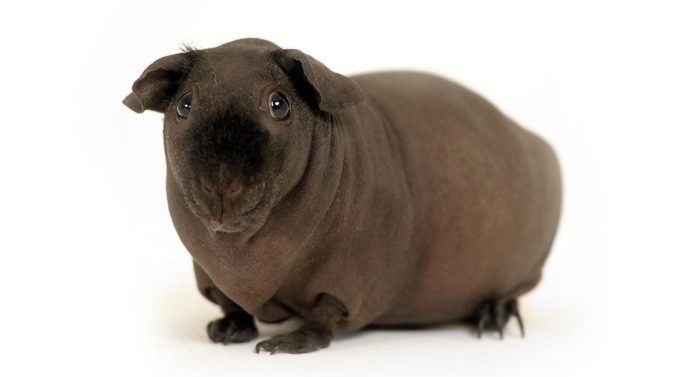

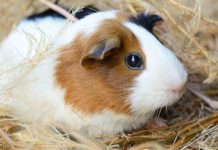
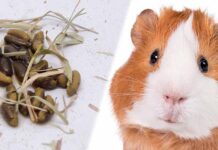











We just bought one male named Harry. They told me males could not be housed together. They also said they couldn’t be kept with haired guinea pigs because they will bite the hairless guinea pig. Is this true? We have had 4 guinea pigs before so we wanted to get a few more, but we didn’t want anyone getting hurt.
Males can definitely be housed together!
I have a male and female. I pulled dad cause mom was prego. Both parents are black. I have 1 black with black eyes 2 grey with red eyes and a grey and white with red eyes. Why do the 3 have red eyes?
I just bought a skinny pig named Fergus. He’s black with black eyes and a skiddish nature as we have cats and dogs who are both curious. He was all alone in the pet shop glass cage. After holding him I couldn’t put him down, so $600 later we had a piggie with all of the accessories and food. I have him sheltered where the other animals can see but not touch and thanks to Amazon, lots more stuff coming.
I just got my skinny pig named him mooch he is very loving and tame…I just love him ..I really don’t want 2 because I would have to get a bigger cage ..all the research I did nothing was said about having to have 2 I knew with rats and mice but not skinny pigs I have had regular Guinea pigs one at a time no problems I do have a play pen for mooch..he seems very content my problem is trimming his nails without hurting him any advice
Thank u
Many places won’t allow you to adopt singles ( unless you already have a piggy herd it can join. )
Every single article I’ve read while researching states they should be kept in pairs at minimum
@Debera,
Guinea Pigs, whether hairless or normal, do need another pig companion. This has been consistent from every source I have read both online and otherwise, including this article.
I am not sure what research you found that suggested otherwise? Could you please link it since I am also doing research and want to be well-informed?
Thanks.
I bought 2 hairless guinea pigs but as they got older 3/4’s of their body is covered wirh thick grisley fur. They look more like buffuli’s than hippos. Why did they become so hairy?
How and where would you test to see if a hairless guinea pig has the gene to produce hairless babies?
I bought 3 Guinea pigs that were of the same litter. I was told they were both females. Well about 3 weeks later, I woke to ha ING two new additions to my Cage. One has hair and the other is a hairless pink colored Guinea pig. I was in shock. I have grown too e this hairless one. He is so ugly that he is cute. I’m getting them looked at to day to see what genders I have. They were born november 1st.
Hey my name is Allison I am 15 years old I have 4 geniea pigs two are hairy ones and two are skinny there names are ozzy sol noon and piggy smalls and yes skinny pigs require some extra care but I also give them baby blankets and extra hides to keep them warm xoxo~allison
my harried guinea pig just had 3 baby today and 2 are hairless, skinny pigs, the one skinny pig won’t eat from the moms nipple. what should I do?
It seems cruel to breed just for their convenience, it is kinda worrying that these types of guinea pigs are more likely going to be affected by the weather, amongst other things.
We have two beautiful little girl skinny pigs. We have had them for 3 years and love them so much. To take care of them properly they can be a little more high maintenance and expensive. To us they are worth every penny. So happy we found this breed of piggie. Couldn’t be cuter!